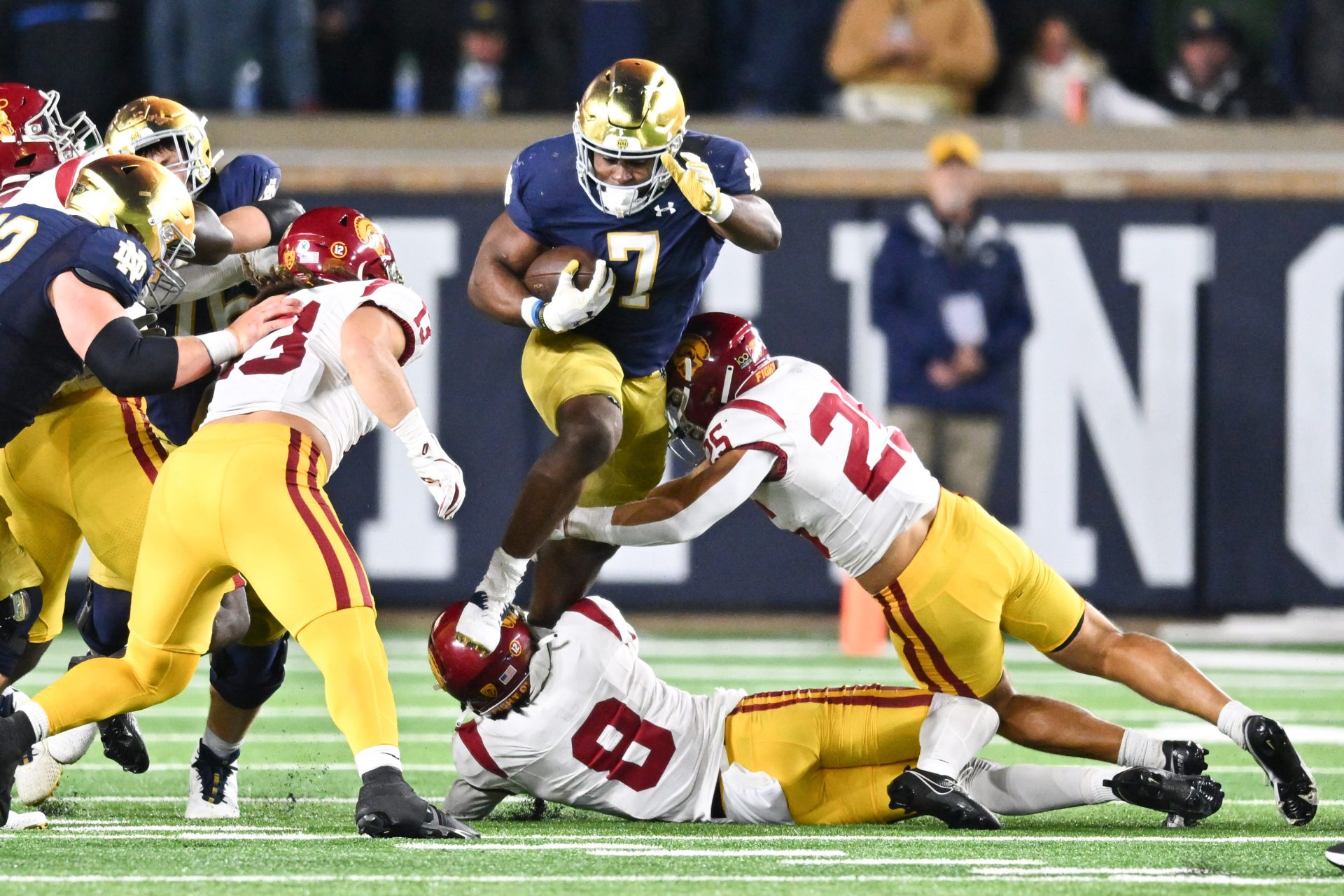The Notre Dame-USC football rivalry is one of college football’s oldest and most historic matchups, dating back nearly 100 years. However, as the sport continues to evolve with conference realignment and shifting priorities, the future of this landmark series hangs in the balance.
This week, Notre Dame HC Marcus Freeman made his stance on the rivalry crystal clear, setting the stage for fresh discussions about its place in modern college football. Speaking to Blue & Gold, an Irish-focused publication, Freeman expressed his unwavering desire to preserve the annual clash with USC.

Marcus Freeman Gets Candid About Notre Dame-USC Rivalry
Marcus Freeman, who took over as Notre Dame’s head coach in December 2021, has quickly become a vocal advocate for preserving the program’s traditions.
Freeman spoke candidly about his desire to continue the annual matchup with USC.
NEW: Notre Dame’s Marcus Freeman wants to play USC every year:
“It’s pretty black and white for me. You want my opinion? I want to play them every single year.
When? I don’t care. I don’t care when we play them. Start of the season, middle of the season, end of the season — I… pic.twitter.com/Hjf64wumHN
— On3 (@On3sports) May 29, 2025
“It’s pretty black and white for me. You want my opinion? I want to play them every single year. When? I don’t care. I don’t care when we play them. Start of the season, middle of the season, end of the season, I don’t care. I want to play USC every year because it’s great for college football,” Freeman stated.
Freeman’s comments directly respond to ongoing negotiations between the two schools, which have yet to reach an agreement on extending the series beyond 2026.
The Notre Dame head coach, who led the Irish to the national championship game appearance in 2024 after defeating Penn State in the Orange Bowl, understands the cultural and competitive value of the USC game.
However, Freeman’s stance is at odds with Notre Dame’s athletic department. Reports indicate that USC offered to extend the series, proposing that games in South Bend be played in mid-October while maintaining the late November date in Los Angeles.
Notre Dame rejected this proposal, citing scheduling concerns tied to its independent status and other commitments. This disconnect between Freeman and the administration underscores the rivalry’s broader challenges.
USC-Notre Dame Rivalry Is Steeped In History
Numerous sports historians recount that the Notre Dame-USC rivalry began in 1926, following a conversation between the wives of Notre Dame head coach Knute Rockne and USC athletic director Gwynn Wilson.
Since then, the matchup has become one of college football’s most celebrated intersectional rivalries, pitting the Fighting Irish against the Trojans in a battle that often carries national championship implications.
Over the decades, the rivalry has produced staggering numbers that underscore its significance. Notre Dame and USC have combined for 24 national championships, with the Irish claiming 11 and the Trojans securing 13. The two programs have also produced 15 Heisman Trophy winners, with USC edging out Notre Dame 8 to 7.
According to NCAA data, no other rivalry in college football accounts for as many combined honors. Notre Dame boasts 102 Consensus All-Americans, and USC trails closely with 82. The schools also lead in NFL Draft picks, with Notre Dame at 546 and USC at 530 as of the 2025 season.
The biggest threat to the Notre Dame-USC rivalry is the seismic shift in college football driven by conference realignment. USC’s move to the Big Ten in 2024, alongside UCLA, Oregon, and Washington, has significantly altered its scheduling priorities.
RELATED: Why USC vs. Notre Dame Is More Than Just a Game: The History Behind the Rivalry
The Trojans now face a grueling conference schedule that includes perennial powerhouses Ohio State, Michigan, and Penn State.
USC is scheduled to play at Penn State in 2026, followed by trips to Ohio State in 2027 and Michigan in 2028. These games, which could serve as de facto replacements for Notre Dame, highlight the Trojans’ new reality in the Big Ten.
Notre Dame, meanwhile, remains fiercely independent, a status it has maintained since its football program began. While the Irish have a partial affiliation with the ACC for other sports and play five ACC opponents annually, they have resisted full conference membership.
This independence allows Notre Dame to control its schedule but complicates matchups with power conference teams like USC, which are increasingly locked into rigid conference schedules.
College Sports Network has you covered with the latest news, analysis, insights, and trending stories in college football, men’s college basketball, women’s college basketball, and college baseball!

